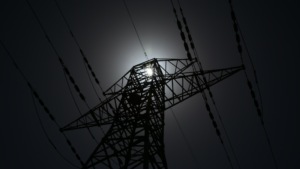
Flashlights, Candles, and Lanterns
Flashlights keep you from stumbling around in the dark. You’ll need at least one for every member of your household. Make sure to store them someplace where you can get to them quickly. But while flashlights help you navigate hallways, candles and lanterns will help you light communal spaces. Because gas and flames are a fire risk, many homeowners prefer electric lanterns. They’re not only bright, but can be carried safely from room to room.
Battery Operated Radio
A radio lets you tune into the emergency broadcast system, to learn the latest news about the blackout, and what actions authorities recommend. To save on batteries, you can buy a hand-cranked radio instead.
Extra Batteries
Flashlight batteries generally last 10-20 hours, while battery-powered lanterns generally last 5-10. Because there’s no way to predict how long a blackout will last, it always pays to have extra batteries. The amount you need depends on the number of devices in your home, but keep enough to change the batteries in every device at least once.
Potable Water
Because pumping stations are normally tied to the same electrical grid as your home, it’s not uncommon for municipal water systems to shut down during a blackout. The average person requires at least one gallon of water per day. To ensure your family has enough to drink, experts recommend you buy enough for at least three days.
Hand Sanitizers
With no running water, moist towelettes are the most effective way to clean your hands during a blackout. A single box is normally enough to last a week, but if you have a large family, you may need two.
Non-Perishable Food
Blackouts deny you access to fresh food. Freezers and refrigerators have to stay shut until the power’s restored. Otherwise, the cold air will escape and the contents will spoil. Fortunately, there are plenty of healthy, non-perishable items you can eat instead, such as:
- Nuts
- Peanut Butter
- Canned Tuna or Salmon
- Canned Soup, Stew, or Chili
- Canned Vegetables
- Canned Fruit
- Crackers and Rice Cakes
- Pancake Mix
- Syrup
- Powdered Milk
- Spam
- Rice
- Granola Bars
Camp Stove
While you can’t cook fresh food during a blackout, you can still enjoy a warm meal. With a camp stove, you can heat soup, boil rice, or make pancakes. Always use it outside, however, at least twenty feet from the nearest window, to avoid inhaling dangerous fumes.
First Aid Kit
Because your ability to contact emergency services may be limited, it’s recommended you keep a first aid kit on hand, to care for minor injuries. Whether you decide to buy one or make one, be sure it includes all or most of the following items:
- Compress Dressings
- Roller Bandage
- Triangle Bandage
- Adhesive Bandages
- Adhesive Cloth Tape
- Antibiotic Ointment
- Antiseptic Wipes
- Aspirin or Ibuprofen
- Gauze Rolls
- Sterile Gauze Pads
- Instant Cold Compress
- Hydrocortisone
- Emergency Blanket
- Breathing Valve
- Latex Gloves
- Thermometer
- Tweezers
Medications
Some medicines become ineffective when stored at room temperature. Make sure you have an ice chest, along with ice, ice packs, or ice bricks, to safely store your prescriptions in case of a blackout. If you have received word of a major storm moving into your area, refill your prescriptions as a precaution.
Generator
Blackouts aren’t much of a concern if you own a generator. You’ll need a unit with a 5,000 – 7,500 watt rating to power your entire home, but even a smaller one can make a world of difference. Imagine being able to run your refrigerator, water heater, and lights while the houses next door are pitch black.
Consult a licensed electrician before wiring a generator into your home, however. You’ll need to make sure it doesn’t feed power back into the main grid and that you have sufficient space to prevent exhaust fumes from seeping back into your house. Some cities require a permit as well, so check with your local building department before installing one.
Portable Chargers
If you can’t afford a generator, portable chargers will at least keep your phones, laptops, and tablets running, so you can work, study, communicate, and entertain yourself even when the lights are out.
Money
With credit and debit cards temporarily disabled, cash is the only way to purchase supplies during a blackout. Withdraw a few hundred dollars just in case you need to buy additional food, water, batteries, or medicine.
Gas
Driving during a blackout can be difficult. Street lights won’t be working and, without power, gas stations won’t be either. Filling up your tank ahead of time ensures you’ll stay mobile until power is restored.
Garage Door
Every electric garage opener has a manual backup: a cord hanging from the arm that connects the door to the opener. Pulling down releases the door, so you can lift it by hand. Test it out at least once before a blackout hits, so you’re prepared in case the worst should happen.
Protecting Your Electrical System
Blackouts are hard on your home’s internal wiring. Once the power has been restored, there’s a surge of electricity, which puts added strain on your electrical system. As a result, areas affected by frequent blackouts are also affected by frequent electrical failures.
For most homeowners, repairing their internal wiring can cost thousands. But for Agway customers, they don’t have to reach into their pockets. That’s because Agway doesn’t just power your home, we protect it. Our EnergyGuardTM covers repairs to your home’s essential systems, including your electrical lines.
There are no service fees, deductibles, or penalties for pre-existing conditions. Every customer is automatically enrolled when they join and there’s no waiting period. Coverage begins right away. So sign up today for incredible savings and peace of mind.